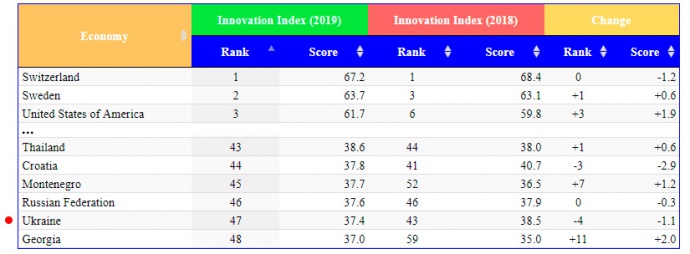
The fourth industrial revolution that is taking place nowadays is radically changing the mindset of business people and people’s lives.
In 2017, according to KPMG in Ukraine, 47% of respondents were ready to implement innovative products, services, and business methods, while in 2018, there were 54% of them.
It is difficult to overestimate the introduction of innovations, but it requires a special approach because the delay can throw the company out of the market.
According to the results of the Global Innovation Index 2019, Ukraine ranks 47th in the ranking of the most innovative countries in the world — minus four positions compared to 2018.

And it’s despite the fact that Ukraine employs about 160 thousand IT professionals, and it is among the leading countries in the world in terms of quality of IT development.
The new currency of the modern world
According to KPMG CEO Outlook 2019, 63% of the world’s executives are not waiting for breakthrough technologies to destroy their businesses, but they are investing in innovative change.
In Ukraine, however, only 35% of CEOs in the next three years plan to increase investment in identifying and applying breakthrough technologies, considering such investment as a long-term one.
At the same time, CEOs in Ukraine and around the world share the view that the ability to adapt quickly is the new business currency, and if they are too slow, they lose. This is the opinion of 91% and 67% of respondents, respectively.
At the same time, 84% of global CEOs and 95% of Ukrainian CEOs are interested in ensuring that their employees implement innovative ideas and do not make mistakes. However, the percentage of respondents is much lower (56% and 66%, respectively), saying that their company has such corporate culture.
co-founder of TECHIIA holding company:
Putting the introduction of technologies on the shelf does not make Ukraine attractive to foreign investors.We can report on increasing the attractiveness of Ukrainian developers on the global market, improving the quality of IT products developed in our R&D. Still, it does not help to move up in the ranking of investment attractiveness.There is a need to create an enabling environment for innovation in Ukraine, and it is the speed of our adaptation that will determine the quality of life in Ukraine as one of the consequences of investments.
Bureaucracy, instability in the country, and the general tendency of Ukrainians to reinsure themselves against risks may become obstacles.
The opportunities justify the risks
Innovations, especially the penetration of new technologies 4.0, can affect the entire economy and social sphere: smart cities, homes, agriculture, finances, public administration, health care, education.
About 95% of new technological ideas embodied in startups are not implemented in real life. Even in Israel, the “startup country,” most projects do not reach the implementation stage.
In the analytical report of Deloitte and Israeli experts on startup development in the industry 4.0, it is said that the majority of technological innovations will come from new, innovative startups. The demand for them is formed by the world’s market leaders and representatives of venture capital.

Startups as “living blood of innovation” are flexible, faster, more creative, and much cheaper than traditional market players: large brands or system integrators.
According to Deloitte’s report, venture capital investment in startups is growing rapidly in the industry 4.0 only. From $600 million in 2013, investment in startups 4.0 increased to $230 billion in 2016, representing a 40% annual growth rate.
The fourth industrial revolution is based on three technologies: the Internet of Things (IoT which allows the exchange of information not only between people but also between machines, devices, and sensors), digital ecosystems and platforms (monitoring and management of physical processes using IIoT technologies), and Data Driven Decision (Data Driven Decision — complex information systems open to use by customers and partners).
Blockchain, virtual, and augmented reality technologies will also be widely used.
The World Economic Forum predicts that most of these technologies will become commonplace by 2027. This means that not only smart houses will appear, but also smart cities, autonomous vehicles on the streets, and artificial intelligence in offices.
, co-founder of TECHIIA holding company:
In our holding, we have VRTX Venture Lab, where we create innovative businesses.We are focused on the search, investment, and development of projects in demand.The speed of project transformation from idea to business influences market relevance and profit generation.To implement the project in Ukraine, overcoming all the bureaucratic and infrastructural obstacles, even when the project already has investments, is a challenge.
What do other countries do to implement innovations?
Roland Berger estimates that the EU economy could lose $605 billion in the near future if it ignores the requirements of the Fourth Industrial Revolution. On the other hand, meeting these requirements may bring in $125 trillion.
It is the EU and the USA that are the largest importers of Ukrainian talents, who develop innovative solutions for them. Thus, according to the DOU.ua rating, the five largest Ukrainian IT companies — Ciklum, LuxSoft, GlobalLogic, SofrServe, and EPAM — work for outsourcing.

According to the forecast of McKinsey, the total economic effect from the introduction of the latest technologies will amount to $14-33 trillion by 2025.
Will Ukraine take advantage of these opportunities?
All prerequisites for the development and implementation of innovations in Ukraine are a strong basic technical education, an army of high-class developers, and their experience in developing IT solutions.
However, our specialists prepare IT products mainly for export, and successful startups do not become Ukrainian companies. They are registered abroad, leaving their R&Ds in Ukraine, which develop IT products for foreign markets.
For example, in Ukraine, there are R&D centers of such tech giants as Oracle, Boeing, Siemens, Samsung, Ericsson.

Unfortunately, the leading Ukrainian startups — Grammarly, Preply, Reply.io — are based abroad, leaving their R&Ds in Ukraine.
Ukrainian business competes at the global level due to its products, and the speed of adaptation in this environment plays a key role.
Developing countries are particularly in need of innovation. This not only helps companies survive in constant competition but also has a positive impact on economic development.
As organizations interact at the micro-level, it is often difficult to see the combined impact of new technologies on the entire society.
Changes will happen anyway. Innovations will make these changes positive for the country in which they occurred and are being developed.
Innovations in companies and enterprises, especially large ones, are not painless and are often perceived by owners as something that destabilizes a company.
Small companies, on the other hand, are quick to upgrade equipment, train staff, change internal communication rules, and can be rebuilt entirely at low cost for the sake of greater benefits in the future.
Such enterprises can produce high-quality products and rapidly expand their markets. Meanwhile, large companies win only in a production scale and gradually lose the consumer due to the refusal to show flexibility, adapt to new conditions, and meet the expectations of customers, which are continually changing.
“The speed at which the company can adapt to changes is proportional to profitability and the number of clients,” says Elchin Aliyev, CEO of Enestech.
“Our solution for computer park management was developed in Ukraine for one club chain. During the year, we translated it into four languages and scaled it up to 25 countries. Now the solution serves about a million users around the world.
The company includes developers who adapt the product not only in terms of languages but also in terms of the mentality of the residents,” Aliyev said.
In the digital environment, Ukraine should follow the global trends of innovation implementation and development. This applies to both industrial automation and digitization of access to services.
The new currency of the modern world — speed — will only strengthen. This affects the economic situation in the country, the quality, and accessibility of communication, medical services, education, the environment, and the development of enterprises.
There are two main ways to improve the economy: to increase the number of sources affecting the growth of the total productivity of the country and to find new ways to use old sources to increase their productivity.
The second one conveys the idea and importance of innovation. People, companies, and countries should look for new ideas and technologies to increase profits without additional sources.
The United States is a wonderful example of such development. A developed agrarian country quickly became industrialized during the First World War. Speaking of people, rapid adaptation to new conditions is a key factor of success.
According to the World Economic Forum, by 2022, 133 million new professions will emerge, while artificial intelligence and robots will gradually replace 75 million old jobs.
 That is, there are only three options: new work for those who are already developing the necessary skills, low-paying jobs for those who do not want to learn and change their skills, and unemployment.
That is, there are only three options: new work for those who are already developing the necessary skills, low-paying jobs for those who do not want to learn and change their skills, and unemployment.
Technological progress will bring humanity a better quality of life due to the growth of the economy. Research shows that there is a direct link between the quality of life of people and the level of innovation in the country.
Also, the level of diseases, poverty, and hunger will be reduced. New technologies create opportunities to improve the situation in poor countries. This applies, for example, to the productivity increases in the agricultural sector.
The level of education will improve significantly. According to the World Bank, even in the poorest 20% of the world’s population, seven out of ten people have smartphones. This means that the development of technology will not only expand the range of useful gadgets but will also make them cheaper and more accessible.
This, in turn, will have an impact on the sustainable development of society and business around the world and will help solve acute environmental problems.
All this primarily concerns the business that will develop, produce, and implement technologies. The sooner companies realize that their activities are inextricably tied to the UN’s sustainable development goals, the sooner they will get aboard the train of progress and develop further.
You can read the original article by clicking .


